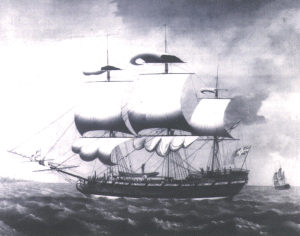|
An
Introduction to the Issue
|
 |
| Welcome
to an introduction to slavery in the British empire. In order
to understand the reason for a forum on slavery, some background
knowledge of the history of the trade will be helpful. As the
European demand for tropical products increased, and the Spanish
and Portuguese introduced African slave labor into their economies,
England could hardly resist the economic and political opportunities
of joining the trade. |
| Through
the Seven Years War, Britain gained a stronghold in the West
Indies. The territorial expansion necessitated the use of slaves
for the islands' development. (1)
The Asiento Contract furthered Britain's involvement in the
trade as part of the Treaty of Utrecht. The English Guinea Company
began Britain's involvement in the carrying trade to the Spanish
colonies in the Americas. (2)
With this Contract, Britain retained the exclusive right to
trade slaves with these colonies until the King terminated the
contract in 1750. |
| The
trade first began as a government endeavor to protect the interests
of empire. Only in 1749 was the trade in slaves opened to the
public. (3) As a result of the
trade becoming a public enterprise, the business flourished.
The increased use of slave labor catered to the public's increased
demands for luxury goods. Coffee houses proved crucial in the
dissemination of the popular cultural habits of drinking tropical
drinks, sweetened with sugar, and smoking tobacco. (4)
This increased importation of tropical products created a rise
in mercantilism to suit supply and demand. |
| The
exchange of manufactured goods for tropical products and slaves
completed a firm link between the Mother Country and her West
Indian colonies. The result was an intertwinement of Britain
in the slave trade on all economic, political, and social levels.
Slavery, in many ways, dictated the daily lives of British citizens
during the 18th century. |
|

click on the image
to go to the first forum on economics
|
|
